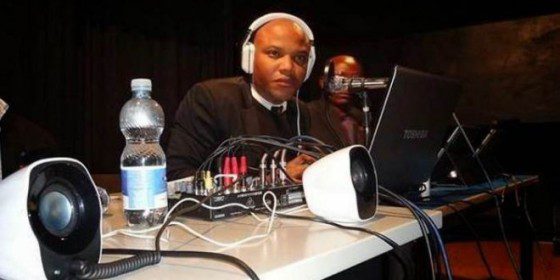National Issues
RTLMC and Radio Biafra: Mirror Images of Hate Broadcast -By Labaran Yusuf


Nnamdi Kanu, Director of Radio Biafra.
Hitler’s propaganda minister, Joseph Goebbels, called radio “the most important instrument of mass influence that exists anywhere”. This makes sense and holds true even for the 21st Century – which despite being dubbed the social media age, radio has for decades played an important role in the mass media.
Radio, an electromagnetic wave transmission of sound messages on a particular frequency, has played a revolutionary role in propaganda wars – battle of the hearts and minds. Governments and revolutionaries alike find it indispensable because of its advantage to disseminate messages quickly across national borders to a large target audience.
Propagandists worldwide, see radio as an enormous propaganda potential, that needs to be tactically exploited. The reason being that the circulation and readership of newspapers in rural areas is limited due to relatively low literacy rates. And consequently, radio is the sole source of news in socio-economic depressed regions of the world.
During the horrific genocide in Rwanda, 1994, the Rwandan media played a major part in inciting, orchestrating, supporting and creating an atmosphere to sanction the terrible human suffering that ensued. From April to July 1994, over 800,000 Tutsis and moderate Hutus were killed. In addition, 250,000 women became victims of sexual violence, many of whom were killed afterwards.
The radio station Radio Télévision Libre des Mille Collines (RTLMC) established in 1993, led the propaganda efforts by broadcasting inflammatory messages calling for the extermination of the Tutsi minority. Prior to the start of the genocide, Rwanda had two national radio stations, RTLMC and Radio Rwanda. Although the government-owned Radio Rwanda had been broadcasting some anti-Tutsi propaganda before the genocide, RTLMC provided the most extreme and incendiary messages.
Radio Biafra, founded at the onset of the Nigerian civil war of 1967 – which was ignited by the declaration of an independent state in the southeast of the country – Biafra, by the Oxford-educated Colonel Ojukwu, leader of the then self-styled Biafra army.
Throughout the war, transmitting from equipment strapped to the top of a moving jeep to avoid detection from state authorities, Radio Biafra broadcasts encouraging speeches of Ojukwu, in a romantic way to keep watch ” Biafra you cannot afford to sleep” blare in the ever-shrinking Biafran territory as Federal forces inch closer to liberating the last remaining rebel-strongholds.
When the war ended, support for Radio Biafra waned and the station eventually stopped broadcasting. Fast-forward 2015, Radio Biafra is back with more incendiary broadcasts. Mazi Nmandi Kanu, the dual British-Nigerian citizen, had been running the station from his home in Peckham in south London. From their before his arrest on 14 October 2015, has been encouraging members of the Igbo community to use violence in their protests.
The broadcast of RTLMC and Radio Biafra is strikingly similar. Spreading lies and propaganda, both stations construct a rhetoric of “us” versus “them” perception. In Rwanda, RTLMC equates the Tutsi as superior and dominating the inferior and subordinate Hutu. Also in Nigeria, Radio Biafra represents the Hausa people of the north as invaders and looters, that dominate the Nigerian political spectrum and though marginalizing the Igbos. While the Yoruba’s of the west are described also as enemies and “ agents of the state”.
Although Radio Biafra transmits from the United Kingdom, RTLMC transmits from hilltops in Kigali – the Rwandan capital. But the chilly dehumanizing broadcast is the same. RTLMC refers to Tutsis and moderate Hutus as inyenzi – cockroaches, while Radio Biafra refers to the Hausas, Yorubas and moderate Igbos as zoo community (animals).
The majority of Nigerians are unwilling to accept the Biafra secessionist self-determination as legitimate. This opposition is linked to the pervasive fear that granting self-determination of aggrieved minorities in multi-ethnic Nigeria would result in the balkanization of the country, state fragmentation and perhaps a gradual unraveling of the interstate system.
Furthermore, mainstream media of some western countries should stop attributing the Biafra issue as an ancient tribal hatred between a minority against a majority. The Nigerian government needs to do its ‘home-work’ and tackle the Radio Biafra problem before its spiral out of control. Nigeria’s unity is non-negotiable, all Nigerians should join hand in preventing Kanu and his Frankenstein monster – Radio Biafra from igniting Biafra 2.0.
Labaran Yusuf is a freelance writer and researcher with expertise on European, Middle-eastern, African and the Americas politics.



















